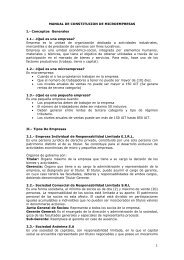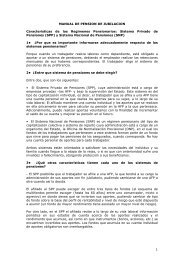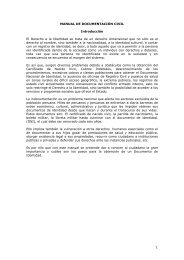ICISS report - International Coalition for the Responsibility to Protect
ICISS report - International Coalition for the Responsibility to Protect
ICISS report - International Coalition for the Responsibility to Protect
Create successful ePaper yourself
Turn your PDF publications into a flip-book with our unique Google optimized e-Paper software.
The <strong>Responsibility</strong> <strong>to</strong> <strong>Protect</strong> 70<br />
military intervention is undertaken. We have argued that <strong>the</strong> responsibility <strong>to</strong> protect<br />
embraces not only <strong>the</strong> responsibility <strong>to</strong> react, but <strong>the</strong> responsibility <strong>to</strong> prevent, and <strong>the</strong><br />
responsibility <strong>to</strong> rebuild.<br />
8.6 As <strong>to</strong> delivery, we found <strong>the</strong> most widespread concern of all. There were <strong>to</strong>o many<br />
occasions during <strong>the</strong> last decade when <strong>the</strong> Security Council, faced with conscience-shocking<br />
situations, failed <strong>to</strong> respond as it should have with timely authorization and support. And<br />
events during <strong>the</strong> 1990s demonstrated on <strong>to</strong>o many occasions that even a decision by <strong>the</strong><br />
Security Council <strong>to</strong> authorize international action <strong>to</strong> address situations of grave humanitarian<br />
concern was no guarantee that any action would be taken, or taken effectively. The Commission<br />
has been conscious of <strong>the</strong> need <strong>to</strong> get operational responses right, and part of our <strong>report</strong> has<br />
been devoted <strong>to</strong> identifying <strong>the</strong> principles and rules that should govern military interventions<br />
<strong>for</strong> human protection purposes.<br />
8.7 But it is even more important <strong>to</strong> get <strong>the</strong> necessary political commitment right, and<br />
this is <strong>the</strong> issue on which we focus in this chapter. It remains <strong>the</strong> case that unless <strong>the</strong><br />
political will can be mustered <strong>to</strong> act when action is called <strong>for</strong>, <strong>the</strong> debate about intervention<br />
<strong>for</strong> human protection purposes will largely be academic. The most compelling task now is<br />
<strong>to</strong> work <strong>to</strong> ensure that when <strong>the</strong> call goes out <strong>to</strong> <strong>the</strong> community of states <strong>for</strong> action, that call<br />
will be answered. There must never again be mass killing or ethnic cleansing. There must be<br />
no more Rwandas.<br />
MOBILIZING DOMESTIC POLITICAL WILL<br />
8.8 The key <strong>to</strong> mobilizing international support is <strong>to</strong> mobilize domestic support, or at<br />
least neutralize domestic opposition. How an issue will play at home – what support or<br />
opposition <strong>the</strong>re will be <strong>for</strong> a particular intervention decision, given <strong>the</strong> significant human<br />
costs and financial costs that may be involved, and <strong>the</strong> domestic resources that may need <strong>to</strong><br />
be reallocated – is always a fac<strong>to</strong>r in international decision making, although <strong>the</strong> extent <strong>to</strong><br />
which <strong>the</strong> domestic fac<strong>to</strong>r comes in<strong>to</strong> play does, however, vary considerably, country by<br />
country and case by case.<br />
8.9 Contextual fac<strong>to</strong>rs like size and power, geography, and <strong>the</strong> nature of <strong>the</strong> political<br />
institutions and culture of <strong>the</strong> country concerned are all important in this respect. Some<br />
countries are just more instinctively internationalist, and more reflexively inclined <strong>to</strong><br />
respond <strong>to</strong> pleas <strong>for</strong> multilateral cooperation, than o<strong>the</strong>rs: really major powers tend never <strong>to</strong><br />
be as interested in multilateralism as middle powers and small powers, because <strong>the</strong>y don’t<br />
think <strong>the</strong>y have <strong>to</strong> be. Geographic proximity comes in<strong>to</strong> play, simply because what happens<br />
nearby is more likely <strong>to</strong> endanger nationals, <strong>to</strong> raise significant security concerns, and <strong>to</strong><br />
result in refugees, economic disruptions and unwanted political spillovers – and <strong>to</strong> capture<br />
media attention and generate demands <strong>for</strong> action accordingly. By contrast, cultural affinity<br />
can mean particular concern <strong>for</strong> <strong>the</strong> plight of co-religionists, or fellow language speakers,<br />
even in small countries far away. Again, an extremely inward-looking political culture,<br />
by contrast, can find it hard <strong>to</strong> accommodate any external supporting role; many political<br />
systems disproportionately reward political ac<strong>to</strong>rs whose focus and commitments are wholly<br />
domestic in character, leaving quite isolated those willing <strong>to</strong> stand up <strong>for</strong> international<br />
engagement.<br />
8.10 Particular caution is also routinely <strong>to</strong> be expected from those countries in possession<br />
of <strong>the</strong> military, police, economic and o<strong>the</strong>r assets that are most in demand in implementing<br />
intervention mandates. Given <strong>the</strong> magnitude of continuing operations in <strong>the</strong> Balkans<br />
(more than 50,000 troops), as well as <strong>the</strong> shrinking military budgets of most countries in









